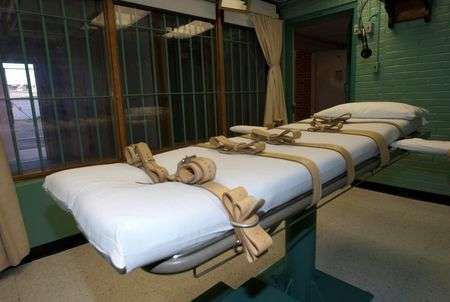Among the states affected are Florida and Oklahoma, which have been among the leaders in executions since the U.S. Supreme Court reinstated the death penalty in 1976. Drug scarcity is also an obstacle for Alabama, Arizona, Arkansas, Delaware, Indiana, Kentucky, Louisiana, Mississippi, South Carolina, Tennessee and Wyoming. Since many mostly European drugmakers began banning sales of their products for use in executions about five years ago over ethical concerns, U.S. states have often turned to lightly regulated compounding pharmacies, which can mix chemicals.
That has resulted in a string of lawsuits challenging secrecy in procurement and the quality of the mixes provided. Middlemen who flout Pfizer's ban could face sanctions. "Now a distributor who violates Pfizer's policies can face contractual liability and termination of its ability to sell any of Pfizer's medicines," said Robert Dunham, executive director of the nonprofit Death Penalty Information Center, which monitors capital punishment. Ohio, which has executed 53 inmates since the U.S. Supreme Court reinstated the death penalty in 1976, said last year it was delaying all executions until at least 2017 due to trouble obtaining the necessary drugs. The state's problems worsened with Pfizer's decision because drugs on Ohio's protocol were on the company's list.
BANNED DRUGS
The chemicals banned for sale by Pfizer include the sedative midazolam, which has been used to render a prisoner unconscious, as well as pancuronium bromide, which can be used as a paralytic agent that halts breathing, and potassium chloride, which can cause cardiac arrest. Thirty-one U.S. states have the death penalty. But only six have an established one-drug protocol, including Texas, Georgia and Missouri, while two others where executions are on hold have plans to use a single drug for executions, according to the Death Penalty Information Center. The single drug most often used is pentobarbital, which is not made by Pfizer.
Texas, which has executed 537 prisoners since 1976, more than any other state, said it should be able to obtain the chemicals it needs. "It's not anticipated that Pfizer's decision will have an impact on the agency's current ability to carry out executions," said Jason Clark, a spokesman for the Texas Department of Criminal Justice. Many of the states that rely on compounding pharmacies have laws banning the release of the pharmacies' names, which they say is needed as a security precaution.
But Dale Baich, an attorney for death row inmates, rejected that. "The purpose of the secrecy is to keep companies in the dark about the misuse of their products," Baich said. States have also looked overseas. Last year the U.S. Food and Drug Administration impounded a shipment of the execution drug sodium thiopental, ordered by Texas and Arizona from India, saying its import was banned and it has no legal use in the United States.
DECLINING EXECUTIONS
The number of U.S. executions has been on the decline for years, falling to 28 in 2015, the lowest in more than two decades, and well off a peak of 98 in 1999, according to the Death Penalty Information Center. "They (Pfizer) have caved in to pressure from the anti-death penalty side," said Kent Scheidegger, legal director of the Criminal Justice Legal Foundation, a victims' rights organization that supports the death penalty. Last year, only six U.S. states conducted executions. Among those, Florida and Oklahoma currently have a moratorium on executions in place due to legal battles. One of the drugs on the Pfizer list, midazolam, was at the center of a U.S. Supreme Court decision last year where the court by a 5-4 margin upheld its use in Oklahoma.
The drug was used in troubled executions in Arizona and Oklahoma where death row inmates were seen twisting on gurneys for several minutes. It has also been employed in executions in Florida, Ohio, and Alabama. The option for several states has been to consider using the single drug method like Texas, or explore alternatives such as bringing back firing squads, gas chambers and electric chairs. "Lethal injection fails miserably," said Robert Blecker, a criminal law professor at New York Law School who advocates the death penalty for the worst of the worst. "I hope the Pfizer decision moves states to choose a more honest method to kill those who deserve to die."
Source: Pulse Nigeria

 More than 20 US states that use a combination of drugs to carry out lethal injections will find it harder to conduct executions due to Pfizer's ban on sales of its chemicals, but the move will have little impact on the handful that rely on a single drug.
More than 20 US states that use a combination of drugs to carry out lethal injections will find it harder to conduct executions due to Pfizer's ban on sales of its chemicals, but the move will have little impact on the handful that rely on a single drug.




